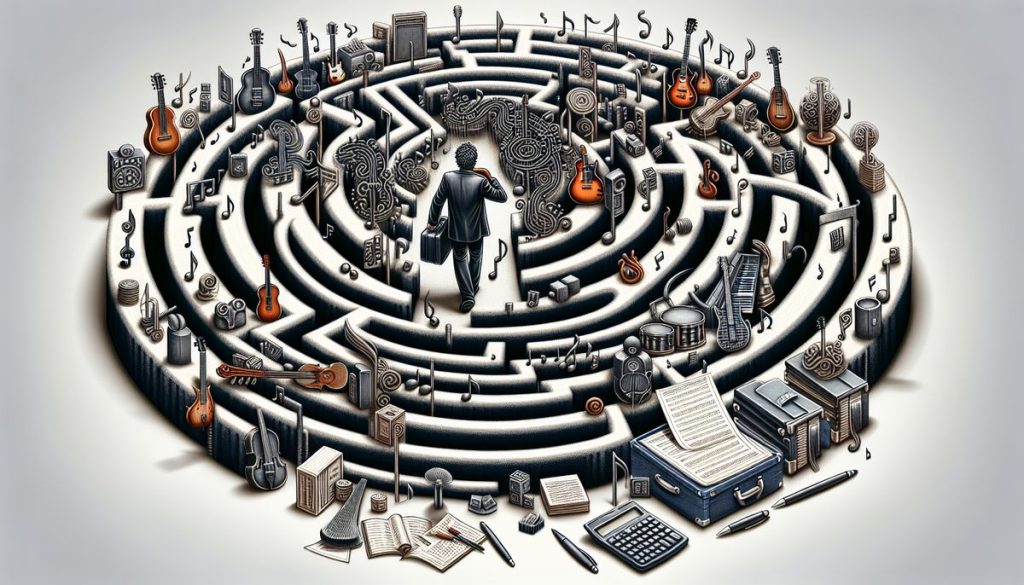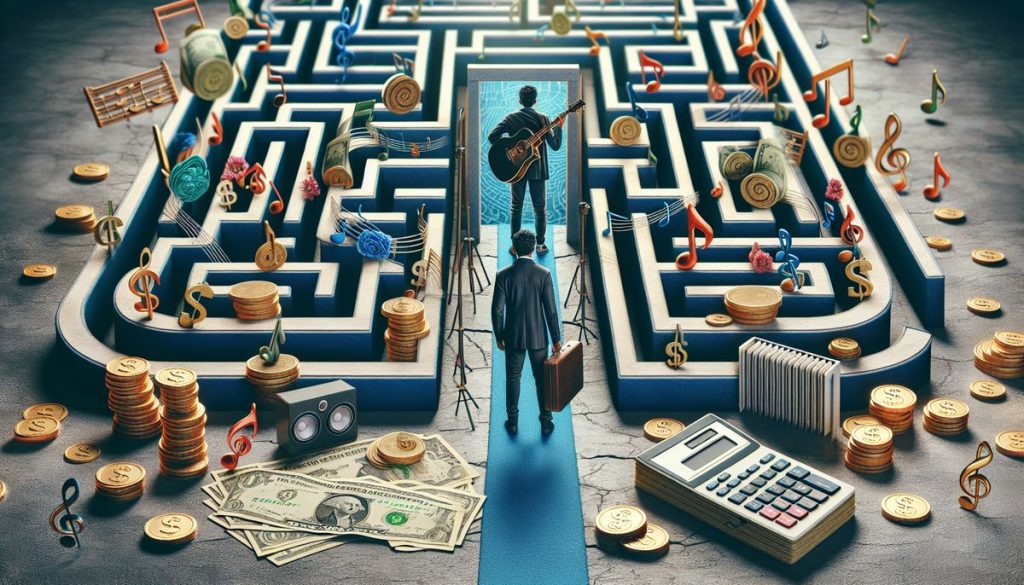Understanding Music Royalties: A Guide for Emerging Artists on Global Rights Organizations
Written by DJ Prodigee on Tue Mar, 2024
As an emerging artist in the ever-evolving music industry, understanding the financial intricacies of royalties and rights is crucial. This article aims to demystify the complex world of music royalties, guiding you through the various types of royalties, professional rights organizations, and the global nuances of the industry. Whether you’re dealing with your first royalty check or aiming to maximize your earnings, knowledge of these elements is vital for your success.
Key Takeaways
- Music royalties are essential for artists, ensuring fair compensation for the use of their work in various mediums such as recordings, performances, and digital platforms.
- Understanding the different types of royalties, including mechanical, performance, synchronization, and print, is key to maximizing your income as an artist.
- Global rights organizations, including Performing Rights Organizations (PROs) and Mechanical Rights Societies, play a critical role in collecting and distributing royalties to artists worldwide.
- The digital age has transformed music consumption, necessitating a grasp of how streaming services and online sales impact royalty earnings and the importance of digital rights management.
- Proactive steps such as registering music with the appropriate organizations, understanding contracts, and actively seeking sync placements are crucial for artists to ensure they receive all royalties due.
Show Me the Money: The ABCs of Music Royalties
Mechanical Royalties: The Wind-Up Bird of the Music World
Imagine every time your tune gets a spin on the digital jukebox of streaming services, a tiny coin drops into your piggy bank. That’s mechanical royalties for you, the unsung hero of your bank account. Every click, stream, and download is a penny in your pocket, and with the rise of digital media, those pennies can add up to a pretty penny indeed.
But don’t start counting your chickens—or should I say, vinyls—just yet. While the Mechanical Licensing Collective (MLC) has been working hard to make sure songwriters and publishers get their fair share, with nearly $400 million in additional payouts on the table, the world of mechanical royalties is as complex as your Aunt Edna’s lasagna recipe.
Here’s a quick breakdown of where these royalties come from:
- Streams: Every time someone streams your song, cha-ching!
- Downloads: Those digital purchases still count.
- Physical Sales: Yes, CDs and vinyls are still a thing.
Remember, your music publisher will be a member of a mechanical rights collection society, like the MLC or Harry Fox in the USA, and they’re the ones making sure your mechanical royalties don’t just disappear into the ether.
Performance Royalties: The Applause That Pays
Let’s face it, every time your jam hits the airwaves or gets the crowd grooving at the local dive bar, you should be raking in the moolah. Performance royalties are like your music’s salary for being the life of the party. But how do you make sure you’re getting every last dime of that sweet, sweet applause cash?
- First, sign up with a Performing Rights Organization (PRO). They’re the bouncers of the music money club, making sure venues pay up for spinning your tunes.
- Keep track of where and when your music is played. No detail is too small; that elevator rendition of your song still counts!
- Register your gigs, even the ones where the audience is just your mom and the bartender. Every play has potential to add to your piggy bank.
Remember, if your music is the soundtrack to someone’s shopping spree or latte sipping, you’re owed a piece of the action. Don’t let your anthems become charity work!
A shocking stat from the halls of Berkeley College of Music: up to half of royalties don’t find their way home. That’s like throwing a party and not showing up for your own cake! Make sure your PRO has your back, and your tracks, so you can laugh all the way to the bank.
Synchronization Royalties: When Your Tune Ties the Knot with Visuals
Imagine your latest banger getting hitched to a blockbuster movie scene. That’s synchronization royalties for you, the matchmaker of music and moving pictures. When your jam weds visuals, it’s not just about the feels; it’s about the deals. Sync royalties are the dowry your tunes get when they cozy up with video content—be it a tear-jerker ad or a zombie-slaying game sequence.
But how do you get your slice of the sync pie? First, you need a sync license, like a permission slip that says, ‘Yeah, go ahead and make my song the soundtrack to your existential crisis montage.’ You get paid directly from the folks who need your music to set the mood—TV studios, ad agencies, or game developers. And remember, if a sync agent loves your track, they’ll play cupid for a cut of the action, not for an upfront fee.
- Pitch your music: Make sure it’s heard by those who sync it up.
- No pre-pay: Legit sync agents earn their keep from the deal, not your pocket.
- Explore all avenues: Even smaller gigs like wedding videos can add up.
Sync royalties: A guide for the streaming & social media era. Synchronization enables compelling music licensing opportunities spanning traditional mediums. From film and TV to social media platforms like TikTok.
Print Royalties: Because Sheet Happens
Let’s face it, in the world of music royalties, print royalties are like that cousin who shows up at family reunions—you know, the one who’s surprisingly good at trivia and somehow always has a little cash to throw around. Print royalties may not be the flashiest revenue stream, but they’re still a legit way to pad your wallet. Every time someone buys your sheet music or a songbook with your tune in it, you’re owed a slice of that pie.
Print royalties are the analog hero in a digital world, and they’re not just for the Beethovens and the Mozarts of yesteryear. Even in our screen-obsessed society, there’s something about the tactile joy of actual paper sheet music that keeps this revenue stream alive. So, don’t overlook the power of a well-placed note on a staff.
Remember, every penny counts when you’re trying to make it in the music biz. So, make sure your compositions are notated, published, and ready to be consumed by the masses in physical form.
Here’s a quick checklist to keep your print royalties rolling in:
- Ensure your compositions are accurately notated.
- Find a reputable publisher or self-publish.
- Register your works with the necessary copyright offices.
- Promote your sheet music alongside your recordings.
By following these steps, you’re not just making music; you’re making sure that music makes cents (and hopefully dollars) for you.
The Global Rights Rodeo: Wrangling Your Royalties Worldwide
Performing Rights Organizations: Your Financial Frenemies
Let’s talk about the Performing Rights Organizations (PROs), those mysterious entities that hold the keys to the treasure chest of royalties. Imagine them as the cool aunt or uncle who shows up at your door with a birthday check – except this check comes with a labyrinth of legalities and a maze of paperwork.
PROs are like your quirky sidekick in the epic quest for cash. They collect money from anyone who uses your tunes – from radio stations to that hipster coffee shop down the street. But don’t start spending that dough on a gold-plated guitar just yet. These organizations take their sweet time tallying up your tunes’ airtime, and when payday rolls around, you might find yourself playing a sad trombone instead of celebrating.
- ASCAP
- BMI
- SESAC
- GMR
These are just a few of the big names in the US, with others like SOCAN and PRS holding down the fort in Canada and the UK, respectively. They’re the ones making sure that when your song gets played, you get paid.
Remember, signing up with a PRO is like swiping right on your music career. It’s a match that could lead to a long-term relationship filled with royalty checks and less ramen for dinner.
Mechanical Rights Societies: The Unsung Heroes of Penny Pinching
Let’s face it, the world of mechanical rights societies is about as sexy as a spreadsheet on a Saturday night. But, just like that spreadsheet, they’re crucial for keeping your finances in check. These unsung heroes are the ones making sure every time your song gets downloaded, streamed, or pressed onto vinyl, a little cha-ching lands in your pocket. Boldly going where no artist has time to go, they collect the pennies that add up to your paycheck.
Mechanical royalties are the shy little siblings of the music royalty family, often overlooked but oh-so-important. In the US, the Mechanical Licensing Collective (MLC) is the new kid on the block, making sure artists get their mechanical dues from streaming services. Remember, if you’re not registered with the MLC or a similar organization, you’re basically giving away your music for free. And who wants to do that?
So, here’s the deal: mechanical rights societies are your financial guardians in the digital realm. They’re the ones fighting the good fight to ensure you get every cent you’re owed.
Here’s a quick breakdown of what you need to know:
- Register with the MLC or your local mechanical rights society.
- Keep tabs on your streams and downloads.
- Don’t forget to chase up those physical sales, too.
By staying on top of these steps, you’ll be well on your way to maximizing your earnings and making sure your music rights are protected. After all, in the wild west of the music industry, it’s every artist for themselves, and these societies are your trusty steeds.
The Sync Agents: Matchmakers of Music and Media
Think of sync agents as the Cupid of the music world, armed with a playlist instead of arrows. They’re the ones behind the scenes, making sure your tunes get cozy with the right visual partners. They’re the matchmakers, pairing your music with everything from tear-jerking movie scenes to that annoyingly catchy commercial jingle.
Sync agents represent the double-threat musicians: those who can belt out a tune and pen a hit. They’re the go-to for music supervisors who need to cut through the red tape of licensing faster than you can say ‘royalty check’. But remember, these agents should only get paid when you do—no upfront costs! They take a slice of the pie, typically between 25% and 50% of the upfront sync fee.
While you might not land a blockbuster deal on your first try, getting your music into smaller projects can be a stepping stone to bigger opportunities. It’s like the music industry’s version of starting in coffee shops before you hit the big stages.
Here’s a quick rundown of what to expect from sync agents:
- They pitch your music to media projects.
- They negotiate sync licenses on your behalf.
- They take a commission from successful placements.
- They should not charge you upfront fees.
So, if you’re ready to see your music set the scene, make sure you’re in tune with a sync agent who’s got your back—and your bank account in mind.
Digital Dough: Streaming in the Cash
The Streaming Struggle: Why Your Bank Account Doesn’t Match Your Play Count
Ever wondered why your streaming stats are through the roof but your wallet’s still collecting cobwebs? Welcome to the streaming struggle, where the numbers game gets real quirky. Interactive streaming revenue is the pot of gold every artist is after, with platforms like Spotify and Apple Music dishing out about 70% of their revenue to the music makers and rights holders. But here’s the kicker: that cash is split more ways than a pizza at a party.
Nearly $400 million is owed to songwriters and publishers, and that’s just the tip of the iceberg. The Mechanical Licensing Collective is like Santa for songwriters, except they’re dealing with a backlog of royalties instead of a sleigh full of toys. And when it comes to YouTube, don’t even get me started. That’s a whole different ball game where ad revenue plays hide and seek with your bank account.
So, what’s an emerging artist to do? Engage fans, focus on quality, and leverage playlists for success. Tips for creators: Ensure originality, check trademarks, get permissions. Quality matters in merch. Making money from streaming requires know-how.
Remember, it’s not just about getting your tunes out there; it’s about wrangling those elusive royalties and making sure they find their way to you. So, buckle up, buttercup – it’s time to get savvy with your streaming strategy.
Download Dollars: Making Cents of Online Sales
In the digital bazaar, every click can be a ka-ching in your virtual cash register. But how do you turn those digital dimes into substantial dollars? It’s all about understanding the flow of funds from the listener’s ear to your pocket.
For starters, let’s talk about the method of receiving payment. If you’re selling your tunes on platforms like iTunes, Google Play, or Amazon, your distributor is your new best friend. They’re the ones making sure your digital dough gets delivered. But remember, if you’re going solo on Bandcamp, you’re the master of your own financial fate—payments come directly to you, no middleman included.
Now, if you’re wondering about the nitty-gritty numbers, here’s a fun fact: sales revenue isn’t universal. In the US, you might pocket around $0.69 per iTunes sale, while in the UK, it’s closer to $0.60. Why? Because local collection organizations like to take their slice of the pie before passing it on.
So, before you start counting your chickens—or downloads—make sure you know who’s collecting the eggs and how much they’re leaving for you in the nest.
And just for kicks, here’s a quick breakdown of where your online sales might be coming from:
The YouTube Money Pit: Ad Revenue and Angry Cats
Diving into the YouTube Money Pit is like trying to count the number of cat videos on the internet – it’s endless, and there’s always one more that demands your attention. But here’s the kicker: those furry feline films and your killer tracks can actually fill your pockets with more than just likes and shares. Every cat video that purrs to the tune of your music could be a mini goldmine.
Let’s break it down. YouTube splits ad revenue, giving the creators a generous 55% cut, while Facebook plays coy, keeping their cards close to their chest. But regardless of the platform’s secrecy, one thing’s for sure: when your music is the soundtrack to the latest viral sensation, you’re in for a payday.
- Audio Recordings: Cash in on any video using your tunes.
- Monetization: Give the green light for ads and watch the dollars roll in.
- Content ID: YouTube’s tracking wizardry ensures you get your share, even from cover songs.
Remember, it’s not just about the videos you upload. Every time your track stars in someone else’s upload, you’re owed a slice of the pie. So, keep an eye out and make sure you’re getting a piece of that ad revenue cake.
In the grand scheme of things, understanding and navigating digital royalties is crucial for emerging artists. It’s about more than just making music; it’s about making sure you’re compensated for your creativity. So, whether it’s a chart-topping hit or the background score to a video of angry cats, make sure you’re set up to collect every penny you deserve.
The Sync or Swim Strategy: Diving into Sync Royalties
The Art of the Deal: Sync Licensing Explained
So you’ve got a tune that’s catchier than a cold in a kindergarten, and now you want to see it light up the screen. Sync licensing is your golden ticket to the visual media wonderland. It’s like asking someone to dance: you need permission, and if they say yes, you’re in for a waltz with the visuals.
But how do you get that sweet sync deal? First, you gotta know who’s holding the purse strings. We’re talking TV studios, ad agencies, film production companies, and those game developers who think 8-bit music is still cool. They’re the ones who’ll pay you directly for the pleasure of pairing your melody with their moving pictures.
Remember, without a sync license, your music’s just a wallflower, watching all the other songs get their groove on.
Here’s a quick rundown of what you need to do:
- Find a sync licensing company or a music supervisor with great taste (like yours, obviously).
- Make sure your music is ready for the big screen. That means top-notch production and a vibe that fits the mood.
- Negotiate like a pro. Know the value of your work and don’t sell yourself short.
And there you have it, a crash course in sync licensing. Get out there and turn those visual projects into your personal ATMs!
Music Supervisors: The Gatekeepers of Your Sync Success
Imagine music supervisors as the high school cool kids at the sync licensing prom. They’ve got the power to crown your track as the prom king or leave it sulking in the corner. These folks are the gatekeepers who decide if your tune gets to tango on the big screen or just keeps swaying alone in your bedroom. They’re the matchmakers of melodies and media, connecting your music with the right visuals to create that magic moment when even the popcorn seems to dance in its bucket.
But how do you get on their good side? Here’s a quick sync success checklist:
- Ensure your music is the perfect fit for their current projects.
- Avoid legal tangles by steering clear of third-party publishers.
- Be ready to move fast; music supervisors love speed.
- Keep your music rights tidy and accessible.
Remember, a music supervisor’s nod can turn your track from a hidden gem into a global anthem. So, polish your pitch, and maybe, just maybe, you’ll be the next indie darling to hit the sync jackpot.
The Sync Checklist: How to Make Your Music More Marketable
So you’ve got tunes that make people want to shake their tail feathers, but how do you get those beats into the big, bad world of visual media? It’s all about making your music as irresistible as a kitten video with a side of pizza. Here’s the lowdown on how to make your music sync-ready:
- Craft catchy, relatable choruses that stick in people’s minds like gum on a hot sidewalk.
- Navigate the treacherous waters of streaming platforms to ensure your tunes are sailing smoothly towards those sweet, sweet royalties.
- Maximize your licensing opportunities because, let’s face it, that’s where the real cheddar is.
- Tour smart, because hitting the road isn’t just about the adventure—it’s about making money while you’re at it.
Remember, it’s not just about having a killer track; it’s about having a track that kills it in the market. Make your music a no-brainer pick for music supervisors by ticking all the right boxes.
And if you’re feeling overwhelmed, just think of it as a game of musical chairs. Except in this game, everyone wants a seat when your music starts playing.
Royalty Wrangling: Tips and Tricks for the Tenacious Tunesmith
Register or Regret: The Importance of Dotting the I’s and Crossing the T’s
Let’s face it, the world of music royalties can be as confusing as a chameleon in a bag of Skittles. But here’s the deal: if you don’t register, you might as well be throwing your hard-earned cash into a black hole. Registering your music is like swiping right on financial security; it’s the first step to ensuring you get every penny you deserve.
So, you’ve got your tunes ready to conquer the world, but before you set them free, make sure you’ve ticked all the right boxes:
- Submit that application to the copyright office, along with a nonrefundable filing fee and a copy of your jam.
- Slap a copyright notice on your work like a superhero badge—it’s your right, so flaunt it!
- Get cozy with performing rights organizations and mechanical rights societies. They’re the ones who’ll be collecting your dough from every corner of the globe.
Remember, it’s not just about making music; it’s about making money from your music. And that starts with registration.
By the way, did you hear about the children’s musician who found a $14,000 surprise in his mailbox? Thanks to SoundExchange, he discovered royalties from Pandora’s children’s channels he didn’t even know he was playing on. Moral of the story: sign up for everything, because you never know where your music is making waves!
The Royalty Hunt: Tracking Down What’s Yours
Imagine you’re a modern-day Indiana Jones, but instead of searching for lost arks, you’re on an epic quest for something far more elusive: your royalties. Boldly navigating the treacherous terrain of the music industry, you’ll need more than a whip and a fedora to claim your treasure. Here’s your trusty map:
- Register your music with performing rights organizations worldwide.
- Don’t forget the mechanical rights collection societies!
- Keep an eye on all performing royalties, no matter where they’re hiding.
- Track down those mechanical royalties like they owe you money (because they do).
- Pitch your music for sync placements like you’re throwing a fastball.
Remember, the music biz is a jungle, and royalties are the rarest of birds. To catch them, you’ve got to be part Sherlock Holmes, part savvy businessperson, and all artist.
A 2015 Berkeley College of Music study found that a staggering amount of royalties never make it to their rightful owners. So, don’t just sit there strumming your guitar, waiting for a check to fall from the sky. Get proactive, and make sure every note you play pays off.
The Fine Print: Understanding Your Contracts and Agreements
Let’s face it, contracts are about as exciting as watching paint dry, but they’re the bread and butter of making sure you don’t get played while you’re getting paid. Read every line like it’s the secret to your next big hit—because, in a way, it is. You might find more clauses than a Santa convention, and some of them can be sneakier than a cat burglar on a moonless night.
When you’re about to sign on the dotted line, remember that negotiation is your new best friend. Don’t just nod and smile; make sure you understand what you’re getting into. Here’s a quick checklist to keep you sharp:
- Are the royalty rates clear as crystal or murky as a swamp?
- Is there a clause about recoupment that could eat into your earnings like a hungry hippo?
- Do you retain your rights, or are you giving away the farm with every signature?
Remember, a good contract is like a good relationship—it’s all about balance and not waking up one day realizing you’ve given away the rights to your own birthday song.
Lastly, don’t be shy to get a legal eagle to peek at your paperwork. They might cost a pretty penny, but they’re worth their weight in gold when it comes to keeping your royalties from becoming a fairy tale.
CONCLUSION
Alright, rockstars and melody maestros, we’ve jammed through the symphony of music royalties and danced around the global rights organizations like we’re avoiding that one chord we can’t quite play in tune. Remember, in this wild industry, knowledge is your backstage pass to success. So, whether you’re strumming in your garage or headlining at Glastonbury, keep your eyes on those royalty checks and don’t let ’em slip through your guitar strings. Now go forth, tune up your business savvy, and may your revenue streams flow as harmoniously as your tunes!







